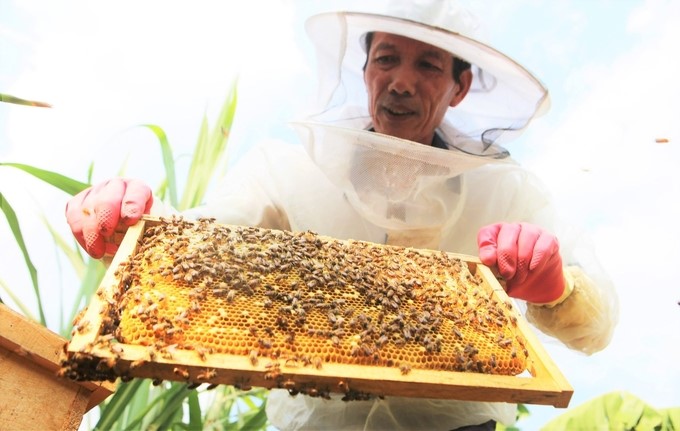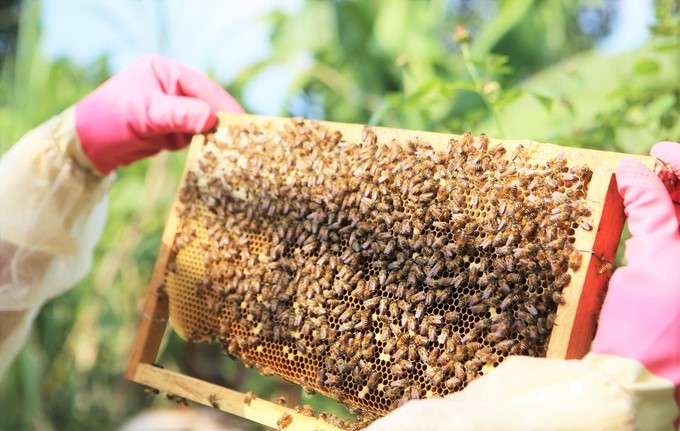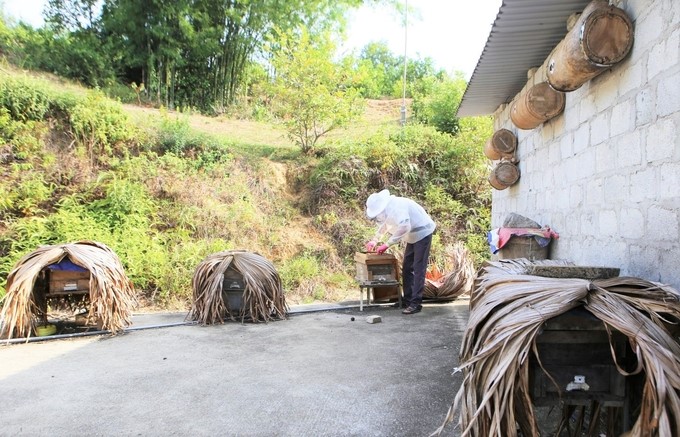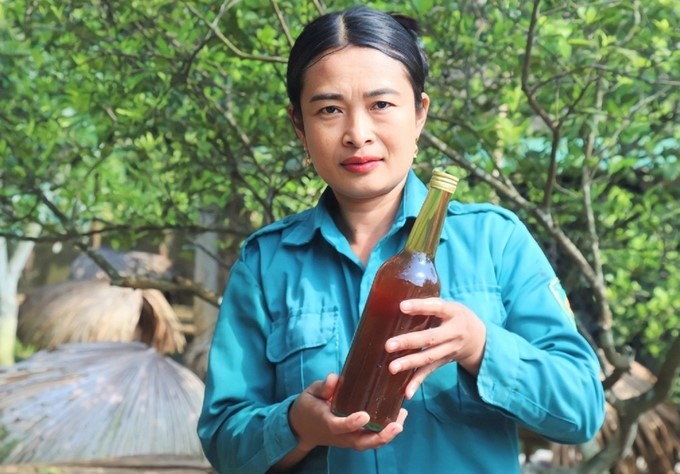November 27, 2025 | 20:32 GMT +7
November 27, 2025 | 20:32 GMT +7
Hotline: 0913.378.918
November 27, 2025 | 20:32 GMT +7
Hotline: 0913.378.918

Mr. Nguyen Dinh Phu is an experienced person in hunting wild bees and domesticating them. Photo: Thanh Nga.
During the migration season of wild bees (also known as honey bees), people in Vu Quang district go to old forest areas and border areas to hunt bees to raise. From these hives of bees, during the honey harvesting season, people can earn tens of millions of dongs.
Mr. Nguyen Dinh Phu, residing in Cao Phong village, Duc Linh commune, is the second most experienced person in domesticating wild bees in Vu Quang district. Every year, after the honey harvesting season (from March to May of the lunar calendar), Mr. Phu begins preparing his tools to hunt wild bees. This species of bee lives in dry, rotten arbors and rock caves in high mountain areas, so capturing them to bring them down the mountain is not easy.

The honeycomb used to domesticate wild bees should be made from jack-tree wood. Photo: Thanh Nga.
According to Mr. Phu, the seasonal change is the appropriate time for catching wild bees because, at this time, hives of bees begin the process of migrating to find a place to winter. When catching a new hive of bees, he brings them home, raises them in wooden boxes with many compartments inside for the bees to produce, and harvests honey when the season comes.
“Catching wild bees requires technique. In addition, bait honeycombs must also be made from wood, such as jack-tree wood, because bees like to live at these stumps. Currently, with 20 wild bee hives I have domesticated and raised in the garden, each year I harvest more than 300kg of honey, with an estimated revenue of over VND 30 million/season," shared Mr. Phu.
Unlike Mr. Phu, who only hunts wild bees to raise, Mr. Tran Van Thang's family, An Phu commune, Vu Quang district, has a total of 20 bee hives being cared for in the garden, of which half are super honey bee species and half are domesticated wild bees.

To prevent wild bee hives from abandoning their combs, it is necessary to capture the queen bee. Photo: Thanh Nga.
According to Mr. Thang, in order to raise wild bees successfully, it is necessary to capture the queen bee. If a whole bee hive is caught, except the queen bee, this hive will gradually die after a period of being raised. In particular, raising bees requires meticulousness and "understanding the bees like understanding ourselves" to avoid making the bees panic.
"The bee is very finicky. If the owner is not gentle, making the bees "irritating", they will sting the owner. The most difficult thing for beekeepers is how to keep the bees from abandoning the comb. There are people who have been raising bees for 6-7 years and still lack experience, leading to crop failures and insignificant honey output," said Mr. Thang.
Raising bees does not take time to care for but does require carefulness. A beekeeper is not only like a mother taking care of her children but also needs to be like a weather forecaster to choose the appropriate time to divide and multiply hives.
Furthermore, bees have very high gregariousness and are sensitive to external influences such as weather, light, and temperature, so breeders need to take appropriate measures to prevent cold and heat; and regularly clean the bins to ensure they are dry and clean. Only then will the bee hive be healthy and have high productivity.

With 20 bee hives being raised, Mr. Phu's family earns about VND 30 million each honey harvesting season. Photo: Thanh Nga.
“This year, the family's 20 bee hives gave a harvest of nearly 200kg of high-quality honey, with a total revenue of approximately VND 20 million. In general, raising bees is not difficult, and the profits are high, so my family feels secure when sticking with this species of livestock," Mr. Thang expressed his excitement.
Currently, Mr. Thang and members of An Phu Cooperative have successfully built the brand "An Phu Honey" and have been recognized as a 3-star OCOP product in 2020.
The entire Vu Quang district now has more than 1,100 bee-farming households with more than 8,000 hives. To help people increase their income from beekeeping for honey and ensure sustainability, the specialized industry and authorities of Vu Quang district have launched many support policies and guided people to apply science and technology to the farming process to improve product quality. At the same time, implement training courses to improve knowledge of raising, disease prevention, treatment, care, breeding, and management of bee hives for people.

The Vu Quang Honey brand is currently favored by customers across the country. Photo: Thanh Nga.
“This year, the honey is in a good season and the price is stable, so people are very excited. In particular, Vu Quang honey products consumed throughout the country have motivated beekeepers to multiply hives as well as comply with technical processes to create the highest quality and most delicious honey lines for consumers," said Mr. Nguyen Van Dung, Deputy Director of the Vu Quang Bee Cooperative and Agricultural Services Union.
Translated by Huyen Vu Thu
/2025/11/27/3830-1-152901_403.jpg)
(VAN) Dong Nai is developing its key crop areas, expanding planting area codes, and applying high technology to increase the value of agricultural products, aiming at a green and sustainable agriculture.

(VAN) Tay Ninh’s livestock sector is undergoing a major transformation, applying high-tech, closed-loop circular models to build sustainable value chains.
/2025/11/26/3627-4-082628_818.jpg)
(VAN) From a small café on the red basalt highlands, Le Van Hoang started a business with clean coffee, building Enjoi Coffee into a symbol of organic agriculture in the Lam Dong plateau.
/2025/11/25/0045-1-135246_13.jpg)
(VAN) Ca Mau is researching a model of sea-encroaching embankments combined with viaducts and logistics service zones, aiming both to prevent erosion and create land funds for marine economic development.

(VAN) The information was shared at the seminar 'Urban Agriculture - Solutions for Developing Green Spaces,' organized by the Kinh te & Do thi Newspaper and the Biotechnology Center of Ho Chi Minh City.
/2025/11/19/4141-2-132831_216.jpg)
(VAN) One of Japfa's outstanding solutions is implementing digital transformation and artificial intelligence (AI) to optimize operations, enhance productivity, and advance sustainable development.
/2025/11/19/4847-1-093540_448.jpg)
(VAN) The Gia Lai Provincial People’s Committee had a working session with the delegation of the U.S. Department of Agriculture, the State of Idaho, and representatives of the State's leading enterprises.